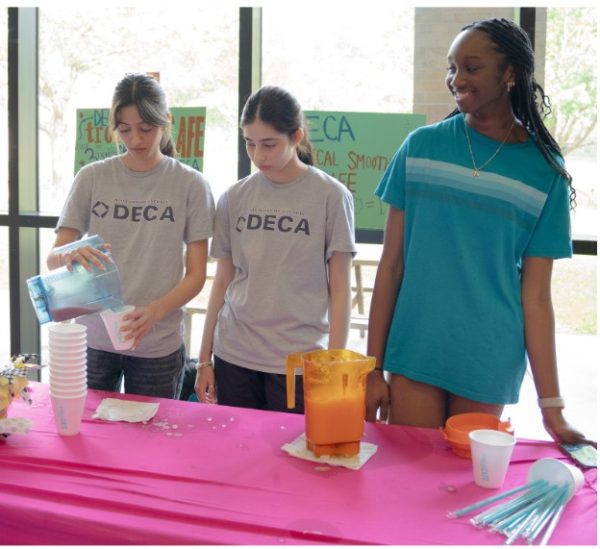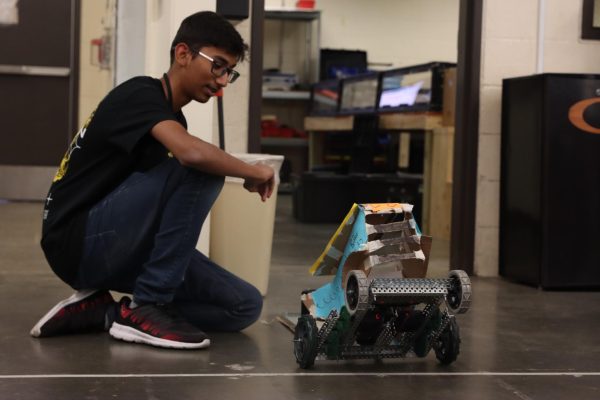‘Mind’ing Your Own Business
On-campus counselors help students tackle tough mental wellness issues
Mental health can affect all aspects of a student’s life, altering their world view and their self-image. This photo illustration captures the image of a girl trying to see a positive reality through a broken mirror.
Mental health is often seen as a taboo topic, an unfortunate handicap, or a shameful secret. Relative silence on psychological wellness at Oak perpetuates this viewpoint.
“I haven’t really seen it addressed much on campus,” junior Alex Medina said. “It’s like it shouldn’t be talked about or it’s hidden.”
Social stigmas around psychological well-being can be stifling, leading many to believe they are alone in their struggles. In truth, mental health issues are more common than most realize.
According to teenmentalhealth.com, 1 in 5 teens suffer from a mental illness. If this statistic holds true, potentially 900 KO students, at least, are struggling with psychological wellness.
Many students think this health crisis deserves more attention and acknowledgement on campus, especially considering mental health impacts every aspect of students’ lives, including their academics.
“[Mental health] definitely has affected friendships and ability to work sometimes or focus and retain things,” senior Natalie Gutierrez said. “Academically it has affected me too; it kind of affects my performance because it takes away focus.”
Another casualty to mental health can be crushed dreams and wavered ambitions.
“It’s been really tricky for me because I feel like in ways it’s prevented me from reaching my potential,” junior Carmen Hunter said. “My anxiety and ADHD can keep me away from opportunities, in a sense.”
In recent years, the district recognizes the need for mental health counselors on campuses across the district. Kristie Erwin, a licensed counselor and crisis team member who works on Oak’s campus with both students and families to overcome mental health circumstances, notes social stress in the suburbs is growing.
“We see a lot of anxiety and depression, and I think a big threat to students’ mental well-being is disconnection,” Erwin said. “Everyone wants to feel connected and sometimes young people or even adults are not as kind as they could be. If we were a lot kinder to each other I think a lot of people would not feel as bad as they do internally. I think a lack of kindness can be a big threat to people in general.”
Because of negative social stigmas, mental health is often seen as an untouchable or unapproachable topic. Because of this, some students may resort to humor as a way to grapple with uncomfortable feelings or cope with their own situations.
“It’s kind of interesting because me and my friends will joke about it a lot,” Hunter said. “I think that’s something that everyone our age does: we turn it into a joke because it’s more comfortable to joke and laugh like ‘ha ha ha, I want to kill myself’ rather than just saying ‘I want to kill myself’.”
Suicide is not a joking matter, even though students may sometimes attempt to minimize their stress or depression through humor rather than facing distressing internal problems head-on. This method of coping can be detrimental and encourages light-mindedness about mental health and further alienates struggling students.
“People who haven’t gone through it, maybe have stereotypes about [mental health] might poke fun and can’t be empathetic towards it because they don’t understand it,” Hunter said.
Students said the school should step up and address the pressures facing teens with social anxieties and other issues. Some called for meetings where students could share their feelings and experiences.
“It would be nice if we had a group to talk about problems,” sophomore Joey Bashor said. “A small group to talk about day-to-day problems or overall problems they’re having at school or home just to get it off their chest. Even kids without mental problems can have a hard time holding everything in.”
Others suggested heightened awareness or resources around campus.“I would ask for more resources to be spread around, like suicide hotlines,” Hunter said. “I would also ask for a counselor; someone we could go and talk to, someone easily accessible. I’d ask for more education and a little more discussion about [mental health].”
Additionally, some desire for mental health to be more openly talked about on campus.
“I definitely wish it was more spoken about and not so private,” Medina said. “I wish teachers would feel comfortable confronting it and counselors were more involved not just with school [scheduling]: they should also be there for us.”
Many students don’t realize that school counselors are not just employed to aid students with academics. Counselors are trained to help students with their mental health and other crises as well, and are available to meet during or after school.
“A student who’s struggling should talk to someone, an adult they trust, because keeping it inside and keeping a secret really intensifies everything,” Erwin said.
Many mental health resources, such as speaking to counselors, are underused on campus. By increasing awareness of student well-being and encouraging more discussion, students and faculty alike can make Oak a more comfortable and ultimately more healthy environment.










